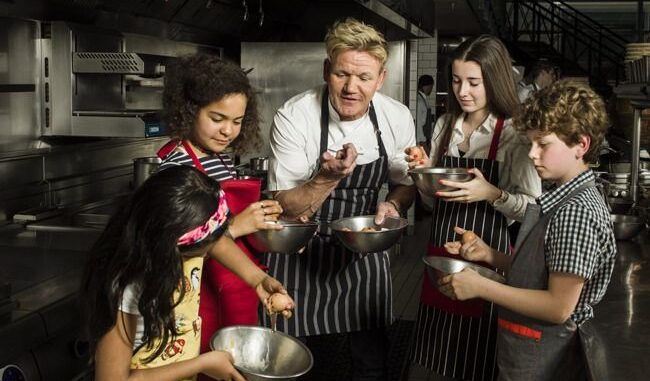
Gordon Ramsay is widely known for his sharp tongue, intense standards, and fearless approach to food. He has built an empire through his Michelin-starred restaurants and his no-nonsense presence on shows like Hell’s Kitchen, Kitchen Nightmares, and MasterChef. But even the most seasoned chef can find himself humbled when he leaves the comfort of the kitchen and steps into nature’s domain. That moment came when Ramsay, on an episode of his National Geographic series Uncharted, met something even pricklier than his reputation: the sea urchin. Known for its dangerous-looking spines and delicately flavored roe, the sea urchin became Ramsay’s adversary during his expedition along Alaska’s rugged coastline.
In the cold waters of the North Pacific, Ramsay joined local foragers and divers who harvest sea urchins as part of their sustainable fishing traditions. Wading into icy seas, diving into kelp-covered rocks, and pulling out the ocean’s most intimidating delicacy, Ramsay realized that even someone with decades of culinary experience still had a lot to learn when it came to working with nature. As he retrieved his first sea urchin, visibly cautious yet determined, he joked that these creatures looked like underwater porcupines and warned that any wrong move could end in a nasty poke. What surprised him even more was that the reward inside this spiny armor was not just edible—it was exquisite. Cracking open the urchin proved to be a delicate art.
The sharp spikes made it nearly impossible to handle barehanded, and Ramsay’s first few attempts ended with colorful language and minor frustration. But after carefully slicing into one with the help of a seasoned diver, he revealed a collection of bright orange lobes nestled inside. These were the prized uni—the edible part of the urchin, revered by chefs and sushi lovers around the globe. Tasting it fresh from the shell, Ramsay was struck by its unexpected flavor: creamy, slightly sweet, deeply briny, and unlike anything else in the sea. Describing it as the ocean’s version of foie gras, he looked visibly moved, not just by the taste but by the process it took to experience it. What made this encounter even more profound was the way it challenged Ramsay’s usual style.

This wasn’t a dish he created from behind the pass or a meal presented on fine china. It was food found through patience, physical effort, and cultural respect. The local Alaskans who guided Ramsay through this process weren’t trained in Parisian kitchens—they were trained by nature, tradition, and necessity. They emphasized sustainable practices, only taking what the environment could afford to give, and always giving back. Ramsay, known for being the teacher, became the student. He admitted on camera that while he’d seen sea urchin on menus for years, he’d never truly understood what it took to bring it from sea to plate until that moment.
This experience wasn’t just about food—it was about humility. Back at the makeshift seaside kitchen, Ramsay prepared a dish inspired by what he’d learned. Using fresh halibut and a sauce made from whipped sea urchin roe and local butter, he created a plate that reflected both his fine-dining expertise and his new respect for foraged ingredients. When the locals tasted the dish and nodded in approval, Ramsay smiled—not with arrogance, but with quiet gratitude. They told him he had listened, and for a chef who built his career on speaking loudly, that compliment seemed to mean more than any Michelin star. What this moment proved, more than anything, is that Gordon Ramsay is evolving.
Gone is the caricature of the angry chef who screams at soggy scallops. In its place stands a man who dives headfirst into uncomfortable situations, learns from people far outside his usual circle, and comes away changed. The sea urchin, with its dangerous spikes and hidden gold, became a symbol for that growth: intimidating at first, but rewarding if you approach it with respect. And in many ways, it mirrored Ramsay himself—fierce on the outside, but filled with substance beneath the surface. For viewers, the takeaway was clear. No matter how successful or experienced you are, there’s always something new to discover, some challenge that forces you to slow down, listen, and learn. Ramsay’s sea urchin moment was raw, real, and unforgettable. It reminded us that food is not just about flavor, but about place, people, and process. And sometimes, even the sharpest chefs can be softened by the sea.
